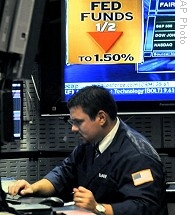-
(单词翻译:双击或拖选)
 |
| Olivier Blanchard (undated photo) |
IMF chief economist3 Olivier Blanchard says the financial crisis will significantly slow global growth during the next year. Speaking at the start of the Washington annual meeting of the IMF and World Bank, Blanchard said the crisis is having its severest impact in advanced economies.
"We predict that growth in advanced countries will be close to zero, or even negative, until at least the middle of 2009, with a slow recovery until the rest of the year," he said.
Blanchard, a French economist and professor at the Massachusetts Institute of Technology, says world growth has been sustained by robust4 growth in China and India. But, he says emerging markets will soon feel the effects of the financial crisis, as well.
"All, or nearly all [emerging economies], will suffer from lower exports to advanced economies, and this will slow down their growth," he said. "Most will suffer from more expensive foreign credit. We are already seeing this happen."
 |
| Wall Street trader, 08 Oct 2008 |
In preparing its forecast, the International Monetary Fund assumed coordinated5 action by the Americans, Europeans and Japanese to stimulate6 growth and avoid a global downturn. The Fund says, after safeguarding financial institutions, governments should use fiscal7 policy to put more money into the hands of consumers.
IMF economists8 applaud Wednesday's action by major central banks acting9 in concert to cut interest rates, a move intended to boost consumer demand by making the cost of credit cheaper. This followed a series of measures taken in recent days to ease the credit crunch10, but stock markets have continued to fall amid concerns about global recession.
Blanchard says the financial shock that first shook banking11 institutions has spread to businesses and consumers.
"Now, consumers and firms have weathered the recent oil and commodity price increases surprisingly well," said Blanchard. "Consumption and investment demand remain quite strong. But, what we see now is that demand is falling very sharply."
Blanchard and his IMF colleagues say there is no chance of a repeat of the global depression of the 1930s, because the lessons of that painful decade have been learned. Foremost among them is that consumer demand must be maintained, so that economic activity does not spiral downward amid corporate12 failures and steeply rising unemployment.
 收听单词发音
收听单词发音
1
monetary

|
|
| adj.货币的,钱的;通货的;金融的;财政的 | |
参考例句: |
|
|
|
2
rippling

|
|
| 起涟漪的,潺潺流水般声音的 | |
参考例句: |
|
|
|
3
economist

|
|
| n.经济学家,经济专家,节俭的人 | |
参考例句: |
|
|
|
4
robust

|
|
| adj.强壮的,强健的,粗野的,需要体力的,浓的 | |
参考例句: |
|
|
|
5
coordinated

|
|
| adj.协调的 | |
参考例句: |
|
|
|
6
stimulate

|
|
| vt.刺激,使兴奋;激励,使…振奋 | |
参考例句: |
|
|
|
7
fiscal

|
|
| adj.财政的,会计的,国库的,国库岁入的 | |
参考例句: |
|
|
|
8
economists

|
|
| n.经济学家,经济专家( economist的名词复数 ) | |
参考例句: |
|
|
|
9
acting

|
|
| n.演戏,行为,假装;adj.代理的,临时的,演出用的 | |
参考例句: |
|
|
|
10
crunch

|
|
| n.关键时刻;艰难局面;v.发出碎裂声 | |
参考例句: |
|
|
|
11
banking

|
|
| n.银行业,银行学,金融业 | |
参考例句: |
|
|
|
12
corporate

|
|
| adj.共同的,全体的;公司的,企业的 | |
参考例句: |
|
|
|















